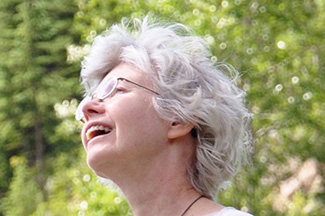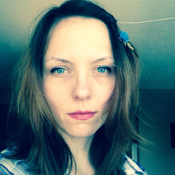Unconventional Insight:
Melissa Stephens in Conversation
with Alice Major

Malahat volunteer Melissa Stephens talks with Long Poem Prize judge Alice Major about the science of her work, the value of the long poem and writing contests, and poetry as communication.
The question of how we occupy or inhabit space is an important theme in your work. In what ways did you connect with communities while serving as the first poet laureate for the City of Edmonton (2005-2007)?
I saw “connecting” as really the biggest part of my responsibility, so I went off and read poems to early-morning Rotary meetings and Chamber of Commerce luncheons—wherever I was asked. But I think my main effort was getting the Edmonton Poetry Festival started. I really wanted to bring the various parts of the city’s poetry community together—the emerging slam scene and the traditional academic poets, poets from different cultures and economic strands, the acclaimed poets and the frankly amateur. I feel a little proud of how the festival is continuing—we have a pretty solid infrastructure now, and I think that inclusive spirit continues to define us.
Your poem, “Envisioning the City” was the winner of the Malahat’s Long Poem Prize in 2001. You retitled this poem “Contemplating the City” for your poetry collection The Occupied World (University of Alberta Press, 2006). What informed your shift in perspective from one of “envisioning” to one of “contemplating?”
I changed the title because our word “contemplate” is derived directly from the ritual that gave me the overall shape of the poem. It’s a ritual derived from Etruscan and Roman times, used in the founding of a city, during which an augur or seer puts the “templum” (template, ideal shape) of a city together with (“con”) a particular chosen site. I’m honestly a bit muddled about the sequence of titles. I think originally I called the poem “Contemplatio,” which is the actual name of the ceremony. But that seemed a bit arcane and pretentious. Then came “Envisioning…,” since that is what the seer does—look at things carefully, just as a poet does. And then I thought, “No, that’s not quite it” and changed it again. I always seem to have the worst time coming up with names for poems!
On your website, you provide a section entitled “Poems for the Ear,” where there are recordings of your poetry with the musical accompaniment of Nora Bumanis, who is identified as the principal harpist of the Edmonton Symphony Orchestra. What does such a collaboration involve? What is your process for choosing poetry for musical accompaniment?
Working with Nora was such fun. It actually started out when we volunteered to be an item to bid on in a charity auction; we were to come along and be the entertainment at a special dinner. For that occasion we decided to match up a couple of poems with music, and because it worked well, we decided to do some more and record them.
The process was a rather simple one: Nora would choose a poem that she liked and decide on a piece of music that would convey an emotional context, or she would play a piece of music and I would think of a poem that it seemed to trigger. Then we would rehearse and mark up a script so that the music was the right number of bars or I paused in the right spots to let the music make its point. Because we were working with existing poems and music, it wasn’t really a process of co-creation where we made something entirely new. (I have often thought that would be interesting to do.) But I did enjoy doing it and liked the results.
SueEllen Campbell has stated that your book Intersecting Sets: A Poet Looks at Science is “an obvious fit for courses in…creative science writing” (ISLE: Interdisciplinary Studies in Literature and Environment). What discoveries have been most significant in your poetic process of examining of science? What do you imagine as a possible future for “creative science writing?”
To tell the truth, I’d rather not have “creative science writing” set off as a kind of sub-genre. In my ideal world, we’d have a higher level of science literacy among writers in general, just as we would like people to have a general feel for world literature or history or the art that informs ekphrastic poetry. Science is basically another way of trying to understand our world. I personally find it a very interesting way—and one that, as it did for Percy Bysshe Shelley, helps me “replenish my store of metaphors.” And I suppose I would like to help people, through those metaphors, understand some of the ideas that scientists are exploring with their language of equations and data collection.
The discoveries that get me most excited tend to be the ones in physics and cosmology, simply because the last century has totally up-ended the old view of science as deterministic and mechanistic. I get quite giddy when I’m reading about quantum field theory or dark energy. These concepts go to the heart of our biggest questions. Where did all this come from? Is the universe one thing or many things?
The other area that really intrigues me is the research into human cognition (and how our brains evolved). These topics don’t give me as much content for poems as math and physics do, but they really inform my way of thinking about what I’m doing as a poet, as an artist. They provide very useful insights towards literary and aesthetic theory – and, in my view, they give me a counter-balance to some of the post-modernist theory that I didn’t like all that much when I was first finding my way as a poet.
Are there any worn-out conventions that you’ve noticed about long poetry? Are there any innovations in the form that excite you?
Oh, well, maybe the desperate need to be unconventional can be a bit tiring. All art is about engaging with convention in some way or another; I don’t think there are any conventions that are inherently more “worn-out” than any others as long as you meet the challenge of using them to create something interesting.
The biggest issue facing a poet who writes long is just that: the length. How do you sustain a reader’s interest for 15 or 20 pages? To me, part of the fun is being able to use many of the devices that fiction uses – voice, point of view and so on. You get to take on the challenges of poetry—using language in ways that are sonically and linguistically exciting—plus the challenges of writing a story. Who is telling it and why? To whom? (I think long poems do need some sort of dramatic arc, even if it isn’t an ordinary narrative. Twenty pages of lyrical dithering comes very close to a self-indulgent wank.)
You can probably tell that I come down on the side of poetry-as-communication rather than poetry-as-a-performance-in-language. So I suppose if there’s anything I find a bit wearing, it is attempts to use unfamiliar typographical conventions to make a work seem more modern. It’s not very kind to a reader, who wanders around trying to remember what an open parenthesis suggests or what a particular white space means in terms of how to read a line. Using a period or comma to indicate a certain length of pause isn’t inherently more “conventional” than using the letter T to indicate a certain position of teeth and tongue. And unfamiliar orthography is just plain riskier in the long poem, simply because a reader has to stick with you for that much more time and life is short.
Having said that, if the voice in the poem requires weird use of the parenthesis and you can orient the reader as to why you are doing it, then go for it!
In what ways are contests valuable to the creative writing process?
Of course contests are valuable in terms of bringing attention to worthwhile work and giving some of us the deadlines we need to get something finished. They can be a way to focus our efforts as writers.
I do think they can be a bit dangerous as well. As soon as you start to think “I’m going to turn this into a prize-winning poem,” you let another consciousness enter into your creative process. You can sabotage your work by trying to write for an imaginary judge. However, if you have written something you feel good about and send it in, and then you make the long list or the short list, it certainly is a boost, a validation. At the very least, a contest gives you the opportunity to know that your poem is read – that you have had another chance to connect with a reader even if you don’t make it to the winning circle. Really, all we are doing as poets is shouting “Helloooo out there” and hoping for an echo. You never know what surfaces your words will bounce off of—or what surfaces they will be absorbed by, even if you never hear the echo back.

Melissa Stephens
* * * * * * * *









